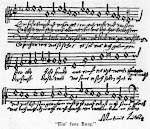A Mighty Fortress is Our God
(Ein’ feste Burg ist unser Gott.)
[An essay by “G. B.”]
A free reworking of the 46th Psalm, composed by Luther in 1529 after the end of the Diet of Speyer, as an open protest song of the entire Protestant Church, which against all its adversaries and enemies trusted in God alone as its refuge and its fortress.
In Coburg, at the fortress, he sang this psalm daily during the Augsburg Diet in 1530, sitting at the window with his lute and looking up to heaven, and he did so, according to Selneccer's testimony, "because the enemies wanted to devour him.” According to some, he first composed this heroic psalm at the fortress of Coburg, according to others on the way, when he traveled to the Diet of Worms in 1521. Along with the song, Luther also created the melody; both are as if from one cast, flowing from the deepest, noblest enthusiasm of his mind, so that he poured his innermost being in richest abundance into the word and the melody.
Dr. Conrad Dietrich was already able to boast of the manner, that it has a special spiritual emphasis, like no other, stirs the heart, cheers it up, makes it joyful and glad in the Lord, gives courage and comfort, sap and strength, where it is only modulated and sung in faithful devotion. From the 3rd verse, the climax of the song, the heroic sense shines forth, with which Luther, in the armor of God, not being afraid even of the arch enemy, had already called out to the dissuading friends sent to him by [Georg] Spalatin on his journey to the Worms Imperial Assembly at Oppenheim: “Even if there are as many devils in Worms as there are tiles on the roofs, I will still go and not be afraid in the least. Even if [Jan] Hus was burned to ashes, the truth has not been burned with him.”
Dr. Jacob Weller [de Wikipedia] says of this verse: “These are the words of a Christian who is completely ready and firm in his faith.” Luther's contemporary, Cyriacus Spangenberg, testifies: “When I looked at Dr. M. Luther 23 years ago in Wittenberg, it seemed to me that I was looking at a large, mighty, well-armed battleship that was confidently deployed among the enemies on the rough sea.”
Very quickly, as if the angels of God themselves had sent messengers, this song spread throughout Germany and all places where adherents of the pure evangelical doctrine lived. As early as 1532, the congregation in Schweinfurt sang it in church against the will of their pastor, and the children sang it at night in the streets, whereupon the Reformation soon took place there.
Melanchthon, Jonas and Creuziger once entered Weimar in 1547, when Wittenberg had been surrendered to the enemy [Capitulation of Wittenberg] and they had been sent into exile. There they heard a little girl singing this song and were greatly comforted by it, especially by the words: “And if the world were full of devils”. Melanchthon, however, said to the pious young singer:
“Sing, dear little daughter, sing; you do not know what great people you are comforting now.”






No comments:
Post a Comment
Comments only accepted when directly related to the post.